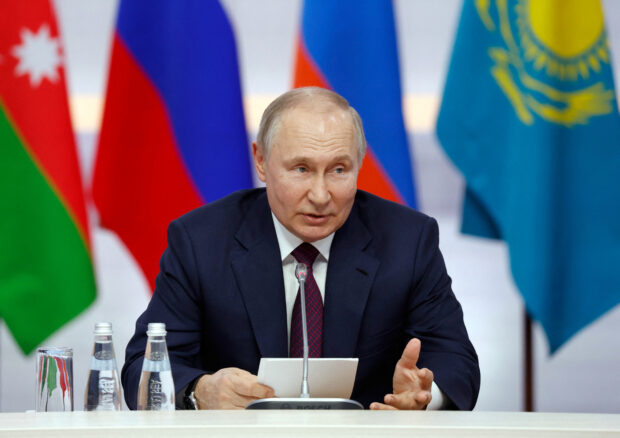Putin ponders: Should Russia try to take Kyiv again?

Russian President Vladimir Putin meets with participants of the Eurasian Intergovernmental Council and the Council of CIS Heads of Government meetings, in Sochi, Russia June 9, 2023. Sputnik/Dmitry Astakhov/Pool via REUTERS/File Photo
MOSCOW — President Vladimir Putin said on Tuesday that any further mobilization would depend on what Russia wanted to achieve in the war in Ukraine, adding that he faced a question only he could answer – should Russia try to take Kyiv again?
More than 15 months since Putin sent troops into Ukraine, Russian and Ukrainian forces are still battling with artillery, tanks and drones along a 1,000-km (600-mile) front line, though well away from the capital Kyiv.
Using the word “war” several times, Putin offered a barrage of warnings to the West, suggesting Russia may have to impose a “sanitary zone” in Ukraine to prevent it attacking Russia and saying Moscow was considering ditching the Black Sea grain deal.
Russia, he said, had no need for nationwide martial law and would keep responding to breaches of its red lines. Many in the United States, Putin said, did not want World War Three, though Washington gave the impression it was unafraid of escalation.
But his most puzzling remark was about Kyiv, which Russian forces tried – and failed – to capture just hours after Putin ordered troops into Ukraine on February 24 last year.
Article continues after this advertisement“Should we return there or not? Why am I asking such a rhetorical question?” Putin told 18 Russian war correspondents and bloggers in the Kremlin.
Article continues after this advertisement“Only I can answer this myself,” Putin said. His comments on Kyiv – during several hours of answering questions – were shown on Russian state television.
Russian troops were beaten back from Kyiv and eventually withdrew to a swathe of land in Ukraine’s east and south which Putin has declared is now part of Russia. Ukraine says it will never rest until every Russian soldier is ejected from its land.
Putin last September announced what he said was a “partial mobilization” of 300,000 reservists, triggering an exodus of at least as many Russian men who sought to dodge the draft by leaving for republics of the former Soviet Union.
Asked about another call-up by state TV war correspondent Alexander Sladkov, Putin said: “There is no such need today.”
Mobilization?
Russia’s paramount leader, though, was less than definitive on the topic, saying it depended on what Moscow wanted to achieve and pointing out that some public figures thought Russia needed 1 million or even 2 million additional men in uniform.
“It depends on what we want,” Putin said.
Though Russia now controls about 18% of Ukraine’s territory, the war has underscored the fault lines of the once mighty Russian armed forces and the vast human cost of fighting urban battles such as in Bakhmut, a small eastern city one twentieth the area of Kyiv.
Putin said the conflict had shown Russia had a lack of high-precision munitions and complex communications equipment.
He said Russia had established control over “almost all” of what he casts as “Novorossiya” (New Russia), a Tsarist-era imperial term for a swathe of southern Ukraine which is now used by Russian nationalists.
At times using Russian slang, Putin said Russia was not going to change course in Ukraine.
Russia’s future plans in Ukraine, he said, would be decided once the Ukrainian counteroffensive, which he said began on June 4, was over.
Ukraine’s offensive has not been successful in any area, Putin said, adding that Ukrainian human losses were 10 times greater than Russia’s.
Ukraine had lost over 160 of its tanks and 25-30% of the vehicles supplied from abroad, he said, while Russia had lost 54 tanks. Ukraine said it has made gains in the counteroffensive.
Reuters could not independently verify statements from either side about the battlefield.
Putin further said Ukraine had deliberately hit the Kakhovka hydro-electric dam on June 6 with U.S.-supplied HIMARS rockets, a step he said had also hindered Kyiv’s counteroffensive efforts. Ukraine says Russia blew up the dam, which Russian forces captured early in the war.
Putin said Russia needed to fight enemy agents and improve its defenses against attacks deep inside its own territory, but that there was no need to follow Ukraine’s example and declare martial law.
“There is no reason to introduce some kind of special regime or martial law in the country. There is no need for such a thing today.”